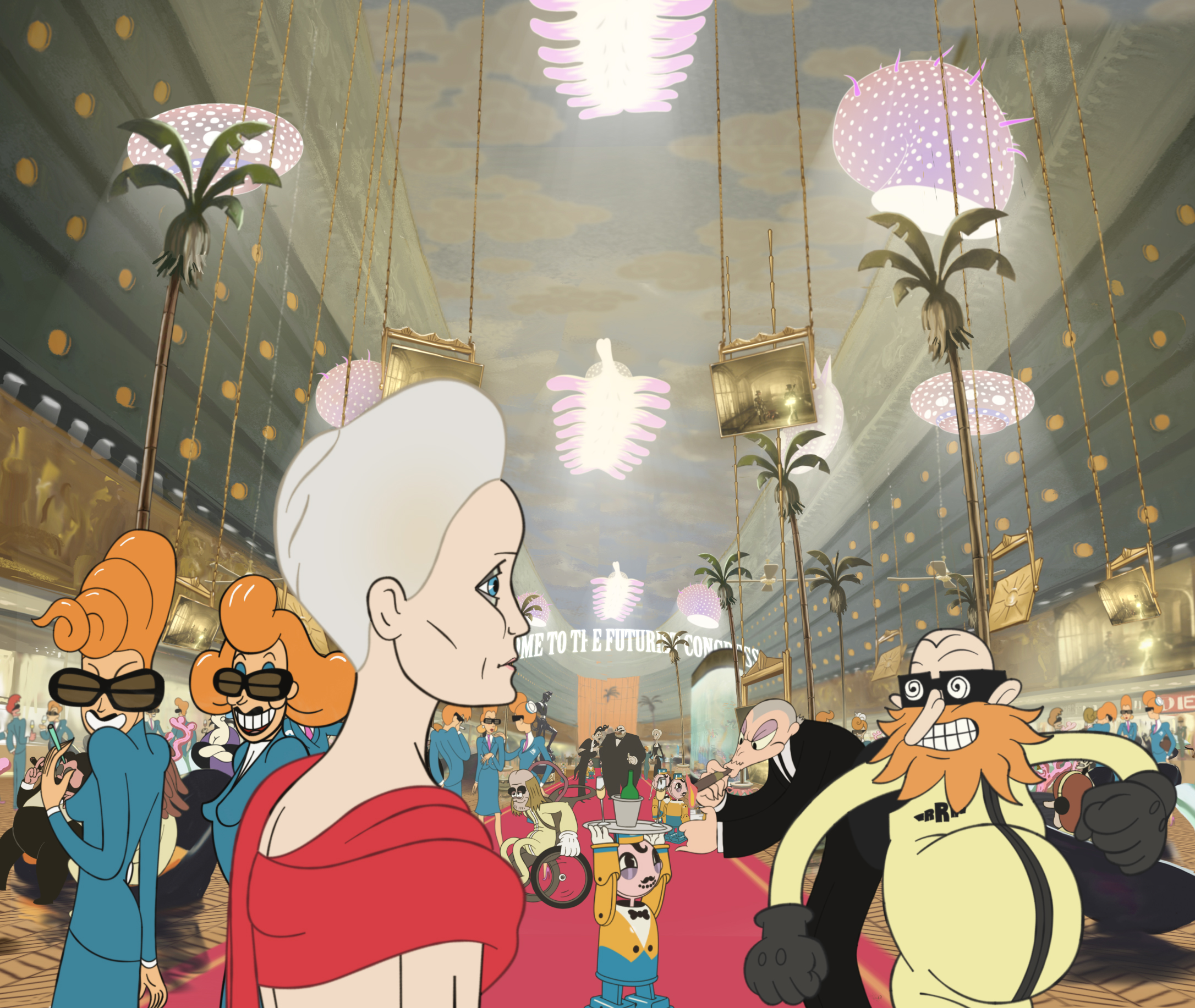CANNES, FRANCE — Tonight “The Congress” officially opens Cannes’s Directors’ Fortnight series, and while I speculated yesterday that the movie’s absence from the main competition might be a bad sign, the film turns out to be the kind of visionary work you can easily imagine alienating as many people as it enchants. At its best, it’s lyrical and mysterious, contemplating age-old sci-fi questions (of artificial intelligence, of perception versus reality) while grafting them onto a commentary about the changing nature of movies.
Directed by Ari Folman (“Waltz with Bashir“), “The Congress” begins as live action and switches to animation midway through. Its second half — particularly the final movement — is the part that appears to draw most heavily on Stanislaw’s Lem’s novel “The Futurological Congress,” the movie’s credited source.
The first part, a Hollywood satire, is invented. Robin Wright stars as “Robin Wright,” a 44-year-old actress who can’t get the parts she used to; she’s told multiple times that bad choices have made her into box office poison. An executive at “Miramount” (Danny Huston) offers her a deal: He wants her to be “sampled,” a process that will enable the studio to store her digitized likeness and use it to make movies. The fake Robin Wright will act in the real one’s stead, perhaps doing things Wright herself would never do.
Can she stand losing control? Wright would also be required to retreat from public life, never acting again. This is the direction moviemaking is headed in, Huston’s character assures her, and the only way to rekindle the magic of her most successful roles — Buttercup in “The Princess Bride” or Jenny in “Forrest Gump.” (That the real Wright is at the height of her powers as an actress, including a superb turn on “House of Cards,” is just part of the joke.)
Even in the early, real-world scenes, the movie traffics in a casual surrealism that recalls Folman’s “Saint Clara” (1996). Wright and her kids live in a converted DC-9 hangar adjacent to an airport. Her son (Kodi Smit-McPhee) flies kites into planes’ landing paths. He suffers from deteriorating hearing and sight; a conversation with his doctor (Paul Giamatti) about the future is what finally persuades Wright to go down the rabbit hole.
To sample her, a cinematographer must capture every expression she has. Wright suffers from a moment of performance anxiety. In a film filled with strange, disarming scenes, few are stranger than the one in which her agent (Harvey Keitel) coaxes the required reactions, telling her how he found his line of work and of his special love for her. It’s one of many moments in “The Congress” that meditate on the seductive power of storytelling and illusions, a theme the movie — provocative in both form and content — returns to again and again.
Flash forward 20 years. The real Wright lives in relative anonymity, while her doppelgänger has become a superstar on the basis of a dunderheaded robot franchise. (Most people dismiss the movies as sci-fi, the ditzy fake Wright says, but she sees them as documentaries.) The real Wright agrees to speak at a conference in a place called Abrahama City; “The Congress” makes a disorienting shift to animation as soon as she enters town. Tellingly, in this world Wright’s closest ally isn’t a cinematographer or an agent but the animator (Jon Hamm, or rather, his voice) who programs her alter ego.
In a dense thicket of philosophizing and the upheaval of an assassination, the narrative loses some of its steam; the basic ideas are familiar from “The Matrix,” “A.I.,” “World on a Wire,” and the film versions of Lem’s own “Solaris.” It’s the kind of movie in which a robot advises Wright, “Everything is in your mind. If you see the dark, then you chose the dark.”
Yet “The Congress” is never inaccessible emotionally, or as a commentary on cinema itself.
“Movies are old news, Robin,” Huston’s aged (and now cartoonified)
studio boss tells her, dismissing the medium as a relic of the last
century. The film begs to differ, waxing nostalgic about the past while
at the same time suggesting bold directions for the medium’s future.
At the Q&A following the screening, Folman said one of his goals was to get as far away from “Bashir” as possible, both in subject and in drawing style. (The film’s look doesn’t necessarily suggest this, but his team found major inspiration in old Fleischer cartoons.) The movie fits Roger Ebert’s axiom that some movies are tailor-made for animation. Whether it’s in the futuristic conference sequences, an interlude showing New York transformed into a city of hanging gardens, or a segment in which humans adopt alternate identities for themselves, the premise requires a degree of visual imagination regular effects could never capture. Passages of hallucinogenic reverie are complemented by Max Richter’s soothing score.
As much as “The Congress” may seem like a departure from the harrowing “Waltz with Bashir” (an animated doc in which Folman grapples with his experiences during Israel’s 1982 Lebanon war), it’s similarly preoccupied with memory, distortions, and the importance of acknowledging reality when faced with a choice between delusion and the truth. Like Wright, Folman attempted to get away — and in the end found himself back where he started.












